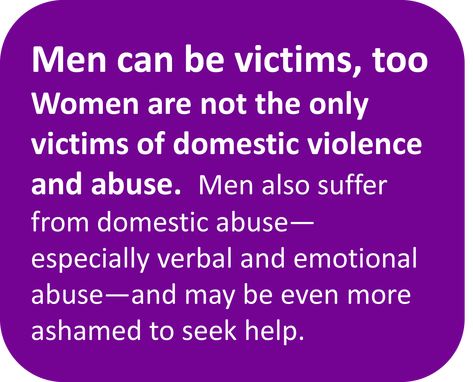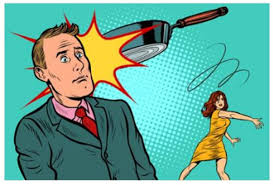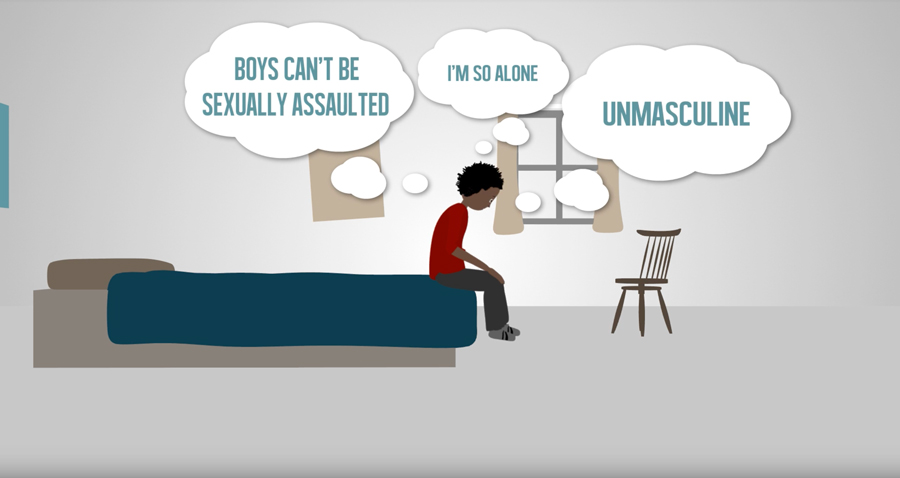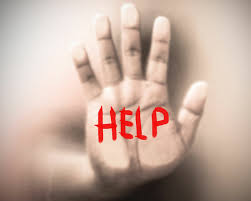It is not always easy for men to come forward about abuse. Sometimes, the shame of being abused by a woman can be too much. But there are many resources available for men who are suffering from domestic violence at the hands of their female partners. In this guide, we will explore the reasons why men stay in abusive relationships. Also, how they can move on with their lives once they have left (help for men who are being abused).
Contents
- 1 Domestic Violence Against Men
- 2 The Vulnerable Male
- 3 Reasons Men Stay in Abusive Relationships
- 4 Putting An End to Abuse Against Men
- 5 Legal Rights For Men Facing Abuse
- 6 Moving On From An Abusive Relationship
- 7 Experts On Abuse Against Men
- 8 Talking To A Professional
- 9 Conclusion
- 10 A Word From Therapy Mantra
Domestic Violence Against Men

Domestic violence does not discriminate. While men are usually thought to be the abusers in violent relationships, this is not always true. The abuser might also be the victim’s female partner. This can happen for many reasons. But one reason it occurs more often than people think is that women have the less physical strength and people generally see them as weaker than men. This means that they might be more likely to suffer from emotional or psychological abuse, which is harder to detect and can have long-term effects on the victim’s mental health.
NOTE: A recent survey found that one out of every three people who suffer from intimate partner violence are men. This means that there could be millions of abused male partners across the United States alone.
Common Forms Of Abuse

There is no single answer to this question, as domestic violence can take many different forms. Generally speaking, any kind of behavior that is used by one partner in an intimate relationship to control or dominate the other is fit to qualify as domestic violence. This might include physical abuse, emotional abuse, sexual abuse, financial abuse, and psychological abuse.
Some of the most common forms of abuse that men face include:
- Using physical violence: This can range from pushing, shoving, and slapping to punching, kicking, biting, or choking.
- Using coercion tactics: Making threats is a way for abusers to gain power over their victims. They might intimidate them by saying things like: “If you don’t do what I want, I’ll hurt you or your family”.
- Emotional abuse: This can involve name-calling, insults, humiliation, constant criticism, or threats of violence.
- Sexual abuse: Forcing someone to have sex against their will, unwanted touching or groping, or making them perform sexual acts they do not want to is a form of sexual abuse.
- Financial abuse: This can include refusing to give the victim money, withholding important financial information, or limiting their access to funds.
- Psychological abuse: Using mind games and manipulating the victim’s feelings to control them is a common tactic of psychological abusers. They might also isolate the victim from family and friends.
Types Of Abuse Specific To Men
There are also some types of abuse that are specific to male victims. For example:
Being ignored: When the abuser is female, the victim might feel like they are not important and that their concerns are not taken seriously. This can lead to a feeling of isolation and helplessness.
Being blamed: The abuser might try to make the victim feel like it is their fault that the abuse is happening. They might say things like “If you would just do what I want, this would stop” or “You’re making me do this.”
Being ridiculed: The abuser might make fun of the victim for being weak or not able to defend themselves. This can cause a great deal of shame and embarrassment.
Common Signs Of Abuse That Men Go Through

While it is not always easy to tell if someone is being abused, some signs indicate they might be experiencing domestic violence. Some of the most common include:
- Show concern over their partner’s whereabouts or safety when they are apart.
- May also try to spend as much time together as possible to avoid their partner becoming angry.
- Have trouble discussing issues related to their personal life with others, including family and friends.
- Have unexplained injuries or bruises.
- Withdraw from friends and activities they once enjoyed.
- The abuser tries to control what the victim wears, eats, or how they spend their time.
- The victim has lowered self-esteem and feels unworthy of love and respect.
- Noticeable change in behavior, such as a sudden drop-off in performance at work or school.
- They have intense mood swings and an unpredictable temper.
- Might also start lying about certain aspects of the relationship or become defensive when asked questions about it.
Common Symptoms Exhibited By Men Facing Abuse
Most men who are victims of domestic violence experience physical symptoms like:
- Headaches,
- Gastrointestinal problems,
- Chronic pain,
- Sexual dysfunction, and
- Difficulty sleeping.
Some men who are victims of domestic violence may experience mental symptoms like:
- Depression,
- Anxiety,
- Irritability,
- Lack of motivation,
- Feeling overwhelmed by negative thoughts and emotions,
- Loss of self-confidence and self-esteem, and
- Thoughts of suicide.
Some men who are victims of domestic violence may experience emotional symptoms like:
- Crying a lot
- Feeling helpless or hopeless
- Having low self-esteem
- Suffering from depression or anxiety
- Experiencing panic attacks
- Feeling ashamed or embarrassed about the situation
- Being reluctant to talk about the abuse
The Vulnerable Male
It is important to note that while men can be victims of abuse, some groups are more vulnerable than others. According to the American Psychological Association (APA), these include:
Older people: This is due to changes in their health and social lives. They might feel alone or isolated because they do not get out as much anymore.
Younger people: This is because they might be dating and not know how to handle a violent relationship. They could feel embarrassed or ashamed about the situation, which can lead them to stay quiet.
Intellectual disabilities: Men who have an intellectual disability are much more likely to suffer from abuse than those without one. In many cases, their abuser will also have an intellectual disability and know how to take advantage of their victim’s vulnerabilities.
Male immigrant victims: This group is at high risk for abuse because they often do not have the language skills or knowledge of the legal system to protect themselves. They might also be afraid of deportation if they contact authorities.
Gay, bisexual, or transgender men: These men are at a higher risk for abuse because they often do not have access to resources like counseling and safe housing. They might also be afraid to come forward due to homophobia or transphobia in the community.
Reasons Men Stay in Abusive Relationships

There are many reasons why men stay in abusive relationships, even when it is clear that the relationship is harmful. The following are some of the most common reasons:
Feel like they have nowhere else to go: This is especially true for men who do not have a strong support system outside of their abusive relationship. They might also be afraid that the abuser will hurt them or their children if they leave.
Love the abuser: It can be hard for men to admit that they have been a victim of emotional manipulation by the abuser. They might feel like it’s their fault and that there is something wrong with them, which makes it even harder to leave.
Do not want anyone else to know about the abuse: This is especially true if a man has children. They might be afraid that they will lose custody of their children if a judge finds out about the abuse.
Putting An End to Abuse Against Men
It is important for men who are being abused to know that it’s not okay and that there is help available for them. The first step should always be getting away from the abuser as safely as possible. Once a man is in a safe place, they can start taking steps to recover from the abuse and begin rebuilding their life.
If you are a man who is being abused, there are steps that you can take to protect yourself. These include:
Recognizing the abuse: Do not ignore things like bruises or injuries and always get medical attention if needed afterward. If someone tries to tell you it was your fault or it was an accident, do not believe them.
Talking about the abuse: Find a friend or family member you can trust and let them know what is going on for your safety as well as theirs. This might be difficult to do at first because of embarrassment or fear that they will think less of you. If this happens, keep looking until you find someone who will support you.
Documenting the abuse: Keep a journal of any abusive incidents and write down events surrounding them as well if possible, including times, dates, places, and witnesses. You can use them later for your protection or to help defend yourself in court should it come to that.
Practical Steps To Take
There are also several steps that you can take to help yourself heal from an abusive relationship. These include:
Moving out: Experts recommend that male victims immediately move out and away from the abuser if at all possible. This will give them time and space for themselves while they work on getting back on their feet.
Getting counseling: A professional can help you understand the abuse and what it is doing to your mind as well as how to cope with future events if they do occur again. This includes learning how to avoid putting yourself in dangerous situations for both physical and emotional health.
Finding a support group: Many online communities focus on helping men who have been the victims of abuse. This will give you a space to talk about what is going on privately as well as provide advice from those who have been through similar experiences themselves.
Taking legal action: If your abuser does not stop their behavior, it might be time to take things up with law enforcement and/or start legal proceedings. This is a difficult decision to make, but it can be the best way to protect yourself and any children you may have.
Legal Rights For Men Facing Abuse
There are many legal rights that men have when it comes to abuse. These can vary depending on the state in which you reside, so be sure to consult with an attorney who is specifically familiar with domestic violence laws. You may also qualify for free legal help to deal with your situation, so be sure to consult a lawyer as soon as possible if you are facing abuse from an intimate partner or spouse.
Common Protections Available For Men
Some of the most important protections include:
Protection from future physical harm: One of the most basic rights that men have when it comes to abuse is protection from future physical harm. This means that the abuser cannot come near you, contact you, or hurt you in any way.
Access to restraining orders: A restraining order is a legal document that orders the abuser to stay away from you and/or cease all contact. If violated, this can lead to legal proceedings and even imprisonment.
Lower standard of proof: The government will usually take your claims about domestic violence more seriously than those made by a victim who is female or another male. This means that it may be easier for you to get protective orders against an abuser and receive full custody of children in the process if needed.
Removal of guns: If the abuser has a gun, he must surrender it to law enforcement. He cannot get it back until the restraining order is lifted and this can also result in jail time if violated. It will also make firearms purchases illegal for him even after your case ends.
Prosecution for false allegations: The government takes domestic violence seriously and believes that false allegations are rare. However, if your abuser makes one, he can be charged with a crime and prosecuted accordingly.
Protection from sexual assault: If the abuse includes sexual assault or rape, you have more legal protection against it than most other people in similar situations would. You should feel comfortable reporting this to the police without fear of repercussions.
Moving On From An Abusive Relationship
It is possible to move on from an abusive relationship, but it will take time and effort. Here are some tips for getting started:
Give yourself time: Healing from emotional and physical abuse can take a long time, so it is important to be patient with yourself. It might also help you deal more effectively if you avoid dating for at least six months after leaving an abusive relationship.
Take care of your mental health: If needed, find appropriate counseling or therapy sessions to better understand what has happened to you. This can be an ongoing process, so do not hesitate to seek help as needed.
Start rebuilding your life: Replace negative activities with positive ones and try to surround yourself with supportive people who will help you heal. It is also important to focus on self-care and do things that make you happy without any external approval.
Practical Tips to Move On
If you are beginning the process of moving on from an abusive relationship, some practical steps can help this process along. These include:
Start with small goals: The first step is often the hardest one, so it helps if you start by taking baby steps forward instead of trying to do everything at once.
Don’t rush anything: It is important to take your time and not force yourself into the next steps, especially if you are experiencing physical pain or other symptoms associated with trauma. You need to be patient with yourself as well as others who may try to push you too quickly.
Be honest about what you need: There is no reason to lie about what you are going through or how much support you might need from others. Let those around you know that this process takes time and help them understand why they cannot rush it along for their own sake as well as your own.
Do not make any big decisions yet: It can be tempting to make major decisions such as ending a relationship or changing jobs after an abusive experience. Experts recommend that you wait until your mind and body are fully recovered. These things should be done only when the time feels right for you.
Experts On Abuse Against Men

There are many experts on abuse against men, and they can provide a great deal of help in terms of understanding the dynamics as well as getting appropriate support. Some notable professionals include:
Richard J. Gelles: He is a professor of sociology at the University of Pennsylvania and has written extensively about domestic violence, including violence against men.
Martie L. Skinner: She is a professor and researcher at the University of Wisconsin-Madison who researches violence against men in intimate relationships as well as other forms of abuse such as sexual assault or stalking.
Elise Lopez: She has worked with many survivors, including male victims of domestic violence, and was one of the first researchers to study the gender dynamics of this issue.
Case Study
John was in a long-term relationship with his wife that turned abusive about two years in. The physical abuse started as slapping and hair pulling, but it quickly escalated to punching, choking, and even using a knife. John tried to leave the relationship on multiple occasions, but his wife would always convince him to come back home. He eventually made it to a shelter for abused men, which was an important step in his recovery.
Talking To A Professional
If you are experiencing abuse, the best thing that you can do is speak with someone who understands what this type of trauma looks like. As they will be able to guide you better as to how you might be able to recover. There are many resources available through domestic violence hotlines, shelters, and other related services.
Therapies For Men Who Are Being Abused
There are several therapies that might be beneficial for men who are being abused. Some of these include:
Cognitive Behavioral Therapy (CBT): This type of therapy helps you to identify and change the thoughts and beliefs that might be contributing to your abuse.
Psychodynamic Therapy: This approach focuses on understanding the unconscious conflicts that may be driving your abusive behavior.
Eye Movement Desensitization and Reprocessing (EMDR): This therapy helps you to process the traumatic events that might be contributing to your abuse.
Conclusion
The process of leaving an abusive relationship can take years depending on what kind of support and care that individual receives. However, it is possible to move on and rebuild a new life after the experience. Remember to take things slow, be honest with yourself and those around you, and focus on your well-being first and foremost.
A Word From Therapy Mantra
Your mental health — Your psychological, emotional, and social well-being — has an impact on every aspect of your life. Positive mental health essentially allows you to effectively deal with life’s everyday challenges.
At TherapyMantra, we have a team of therapists who provide affordable online therapy to assist you with issues such as depression, anxiety, stress, workplace Issues, addiction, relationship, OCD, LGBTQ, and PTSD. You can book a free therapy or download our free Android or iOS app.


